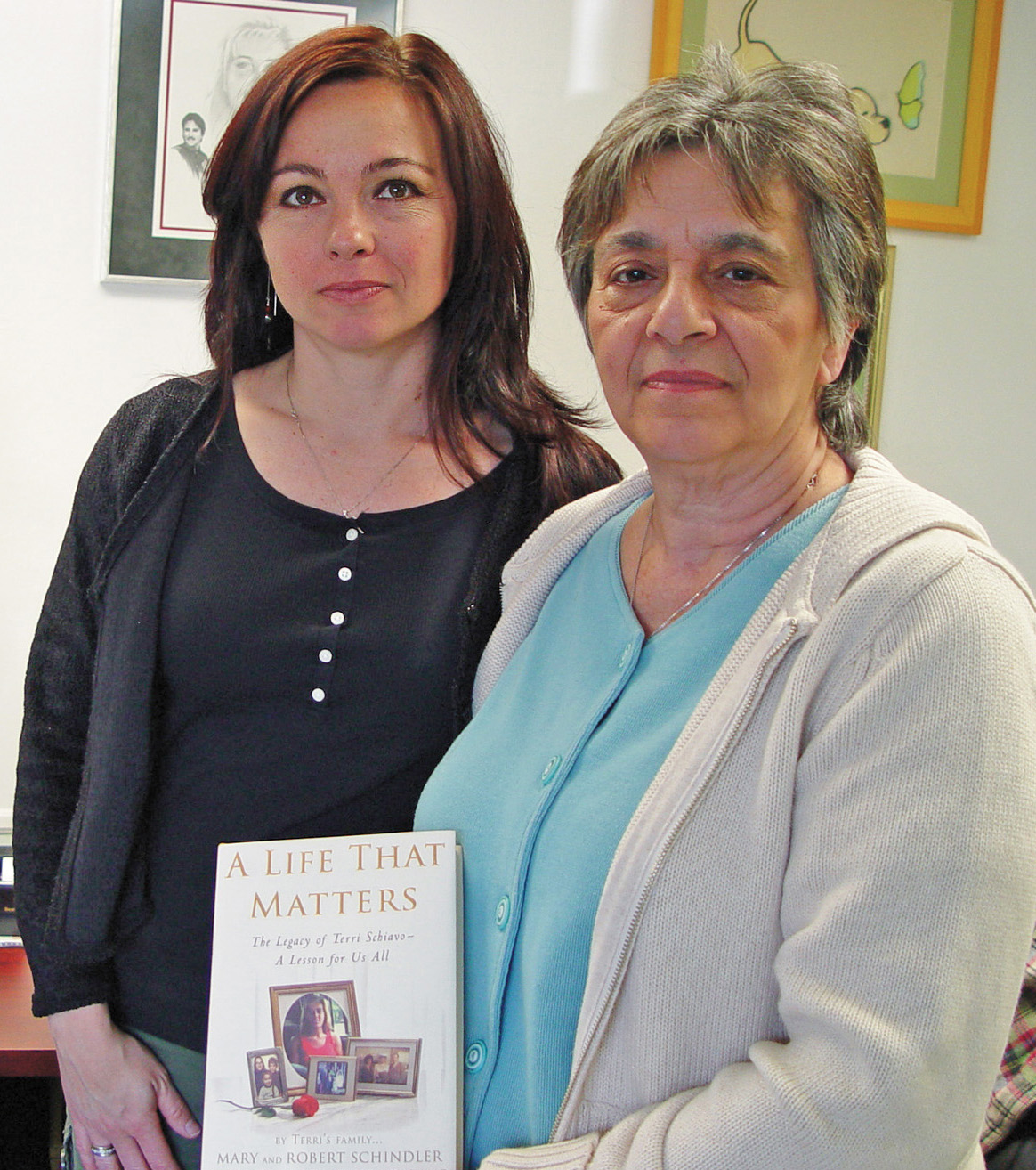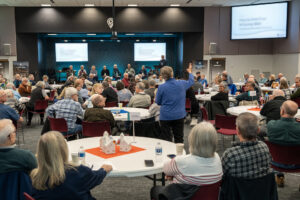
ST. PETERSBURG, Fla. (BP)–After years of legal maneuvers, a failed act of Congress and an emotional and highly publicized conflict between her parents and her husband, Terri Schindler Schiavo died March 31, 2005, at a hospice in Pinellas Park, Fla.
A year later, the orange fences that kept protestors away from hospice property are a distant memory. The on-site protests represented an unknown number of people across the country who believed that dehydrating to death the brain-damaged 40-year-old woman was immoral, unethical and should be against the law.
Terri’s legacy lives on, however, through family members who have dedicated themselves to staffing the Terri Schindler Schiavo Foundation, a nonprofit organization. The family, in late March, also released a book, “A Life That Matters: The Legacy of Terri Schiavo — A Lesson for Us All.”
In a wide-ranging interview with the Florida Baptist Witness before the one-year anniversary of Terri’s death, her mother and father, Mary and Bob Schindler Sr., and her sister, Suzanne Vitadamo, answered questions about how they have coped in the past year, who has supported them and what they think has been accomplished by telling Terri’s story.
The family members said they unanimously decided, along with Terri’s brother, Bobby Schindler, to establish a small office and a library in order to help people become informed about -— and fight against -— euthanasia. Bobby gave up teaching at a Catholic High School in Tampa. Suzanne left the business world where she worked as a stockbroker for six years.
“We’re working very, very hard to see that this never, ever, ever, ever happens again to anybody,” Mary Schindler said.
“It was horrific and it was horrible,” she continued, speaking of watching her daughter wither away for 13 days before she finally died after her feeding and hydration were removed.
“Euthanasia is rearing its ugly head out there right now and there’s a lot of it going on that nobody is hearing about,” Mary said.
Bob Schindler said family members believe they did everything legally possible to save Terri and that there must have been a divine purpose in the timing of her death.
“God chose her as a messenger and we’ve kind of reconciled ourselves to that,” he sighed. “What the courts did is bizarre. They stepped out of the laws to kill her, and at that point when we saw what was going down, we knew that it was God’s will and we put it in His hands.”
Admitting it was hard to let Terri go after fighting for her life until the end, Mary said her daughter’s life and death were not in vain.
“We had to trust in God and believe in God at that point that He knew what He was doing,” she said. “It was very difficult, watching her go through what she went through.
“[God] said America has to wake up,” Mary Schindler continued. She said it has been especially painful in the past several weeks to relive the events in the weeks before Terri’s death.
THE STANDOFF
Michael Schiavo, Terri’s husband and legal guardian, and her parents, had been at odds for nearly a decade since Michael began court proceedings to end his wife’s life. Court-appointed doctors said she was in a persistent vegetative state, and Michael and his relatives testified she would not want to live in that condition.
Bob and Mary Schindler told the Witness in 2003 they suspected that their son-in-law, who recently married his girlfriend with whom he fathered two children while Terri was in the hospice, may have caused Terri’s inexplicable, debilitating collapse in 1990. They also said Terri’s rehabilitation stopped too soon -— shortly after Michael won a malpractice suit against Terri’s doctors, accusing physicians of not diagnosing a possible eating disorder.
Terri’s case catapulted onto the international scene on March 18, 2005, when her feeding tube was removed by order of Pinellas Circuit Court Judge George W. Greer. In the most litigated pro-life case in American history, a battle over Terri’s life raged for nearly two weeks in the state and federal courts, the Florida state legislature and in Congress —- while Terri slowly dehydrated.
And although a medical examiner said on June 15, 2005, that he could not determine why Terri collapsed 16 years ago, he did say results of the autopsy showed that Terri’s brain, at death, was abnormally small and had “profoundly atrophied” to 615 grams. He said no amount of therapy could have reversed her condition at the time of death and that she was blind.
Unlike the information widely disseminated in media reports in the years before Terri’s death that said she had an eating disorder which contributed to her death, the medical examiner found no basis for a conclusion that Terri had bulimia — the explanation used by Michael Schiavo’s attorneys to further their cause in a malpractice suit he won a few years after her collapse. Schiavo used part of the money that had been put into a trust for Terri’s care to instead pay a noted pro-euthanasia attorney, George Felos, to petition the courts to remove her feeding tube.
Despite the autopsy findings that also revealed Terri had a treatable urinary tract infection and pneumonia when she died, her death was attributed to dehydration. The medical examiner said she could have lived “easily” for another decade.
In the final order issued by Judge Greer, not only did he order her feeding tube removed, he also ordered that nothing be given to her by mouth — essentially cutting off any chance of survival on her part if she could have been able to swallow fluids or nutrition of any sort.
AFTER TERRI’S DEATH
For 13 days Terri’s family stayed in a second-hand shop across the street from the hospice where their daughter languished. Each day brought hordes of reporters to what became known as “Terri’s Camp,” a makeshift town of a few huge tractor-trailer media rigs with white canopies and rows of camp chairs for the hordes of local, national and international media captivated by the unfolding drama.
Terri’s supporters, mostly pro-life advocates, and a few who held signs supporting Michael Schiavo, kept up nearly an around-the-clock vigil while attorney David Gibbs III and a crew from his law firm stepped up much-publicized court efforts to restore Terri’s nutrition and hydration.
And a family was beginning to grieve but was not ready to give up the struggle. A year later, they say they won’t just walk away.
“I can’t. I can’t walk away,” Mary Schindler said. “Not the way she died. Other people deserve a chance. They’re people. They’re a person. How could we help them if we walked away?”
Bob Schindler said the nonprofit foundation is contacted regularly by people who are saying doctors and bioethics committees at hospitals are urging them to stop treating family members with various problems.
“People are asking us to help them in situations where they have a loved one who is brain-damaged or disabled and they don’t know what to do,” Bob said. People are advising families to end the lives of those who might be “disabled the rest of their life and [they tell them] it’s better off that they’re dead.”
“Well, we say that’s baloney,” Bob emphasized. “Human life is precious.”
Breaking in, Mary added: “Who are they to play God, anyway?”
About their children’s involvement in the foundation, Mary said she’s “very proud, very happy” to see Bobby and Suzanne so intimately involved in the work in behalf of their now-deceased sister.
“I am sure if Terri was alive and it were one of them, she would be doing the same thing anyway,” Mary said.
Bob said both his and Mary’s families have been “tight-knit” throughout the past several generations. “It just carried on like that,” he said.
Laughing, Bob said of son Bobby, who was away on a speaking trip in Ireland, “Bobby gives us our marching orders every day and it’s hilarious. And we say, ‘OK, Bobby, fine, thank you.’”
Mary said she and Suzanne talk “10 times a day.”
“You know, mothers and daughters,” she sighed.
Of Alexandra (“Alex”), Suzanne’s daughter and the Schindler’s only grandchild, Mary said “we are very, very close with her.”
Suzanne said Alex, now 12, visited with Terri in the hospice throughout her life. Bob said the child never treated “Aunt Terri” differently from anyone else and would talk to her and read stories to her.
Recalling an entry she recently came across in a homework assignment in Alex’s religion notebook, Suzanne said the youngster answered a prompt which asked “What is God’s plan for you?” by writing: “I don’t know yet what God’s plan for me is. However, God’s plan for my family is to fight for those that are disabled and to fight against abortion.”
Alex’s writings took Suzanne by surprise.
Alex also wrote “a little bit more about doing what is right for those that are sick so that it doesn’t happen to anybody else, something along those lines,” Suzanne said. “I was completely shocked. Isn’t that incredible? I was so proud of her. My heart just melted. She’s got it.”
Getting it, to Suzanne, means that Alex knows right from wrong. “She’s a true spirit and a forgiving heart,” Suzanne said. “She knows what we have to do now.”
In coming to terms with Terri’s death, Suzanne compared the feelings she and her family have had to those of Lacy Peterson’s mother.
“Lacy was murdered in a gruesome way, and so was Terri. The only difference is that she gets some justification in that Scott Peterson’s on death row,” Suzanne said. “I think it’s a little hard to see Michael Schiavo out there.”
It’s not a feeling of revenge, however, that Suzanne said she feels when thinking about Terri’s death; it’s a feeling of sadness.
“I think it’s extremely sad what he did to Terri,” Suzanne said. “As Catholics, we are supposed to be Christ-like. Jesus Christ would not want me to run around screaming and yelling. That’s just not my belief and how we’ve been taught.”
Suzanne said she gave up her job as a stockbroker in order to work for the new foundation.
“I do this for Terri and for the other Terri’s that are out there so they do not fall victim to what Terri did,” Suzanne said. “She’s the one that really fought with everything that she had and she’s really the example here.”
A YEAR OF FIRSTS
Thinking back through this past year, Bob and Mary Schindler said it was tough to not decorate Terri’s room for Christmas or other holidays as they had done throughout her stays in hospitals and at the hospice.
“I missed going [to see her],” Mary said. “I used to bring a tree up and put lights up and we would all go there every Christmas day and spend some time with her. It was hard.”
Bob said Saturdays took on a new meaning when he realized he couldn’t head over to see Terri during the week or on the weekend. She simply wasn’t there.
“It was like a void for a while. I thought, I should be up there this weekend,” Bob said. He spoke fondly of Thaddeus Malanowski, a retired Catholic chaplain who visited Terri regularly over the years.
“When the games were on television, Monsignor and Bobby and I used to sit up in her room and watch the ball games and Monsignor used to say to her, ‘Come on Terri, root for Notre Dame!’” Bob recounted.
Malanowski was one of the few local Catholics who supported the Schindlers in their quest for their daughter’s life, Mary said, pointing out that Robert Lynch, a Catholic bishop in St. Petersburg did not support them in their efforts, even after Pope John Paul II issued a declaration naming Terri and emphasizing the Catholic Church’s position on not withholding food and water from patients in a condition similar.
“We had tremendous support from every denomination except from the Catholic Church locally,” Bob said. “Nationally, [Catholics] stood behind us and in the Vatican, the seat of the Catholic Church.”
Of Terri’s condition, Bob and Mary agreed it didn’t matter how injured she was, they always felt she responded to them during their visits.
“We would have accepted her under any condition she was in. It didn’t make any difference to us,” Bob said. “We saw so much. People said we were imagining things, but she was there and we were communicating.”
Suzanne said she believes staying busy helps her cope with her loss, and working with other family members is a bonus.
“We all feel blessed every day to be working with each other,” Suzanne said. “[W]e are not going to be around forever, none of us are, so you might as well take the opportunity to be with the ones you love every chance you can.”
Mary said she tries not to think too much about the events of last year, but prays a lot.
“I pray for calmness to help me get through this. I pray that Terri’s OK. I pray that she’s happy. I just pray that she’s not suffering anymore. It helps me,” Mary said. “Definitely, I would love to have her with me, near me. But I can’t; but our Lord has her and I pray that she’s happy.”
Recalling happy times, Mary said she remembers going into the hospice to visit Terri and seeing “her smile, the way she laughed, how she knew who I was. The way she tried to talk to me. I think of her every day — just how happy she was and she did not have to die.
“There was absolutely no reason for her to die. That’s what I think about. She was disabled,” Mary continued. “She was brain-damaged and she was a happy, happy little girl and that’s how I think of her.”
And when Bob is asked why God didn’t answer their prayers, Bob sighs and said He did.
“Without God, we would not have made it,” Bob said. “Maybe the prayers weren’t meant to save Terri, but to help us get through this.”
–30–
Joni B. Hannigan is managing editor of the Florida Baptist Witness, on the Web at www.floridabaptistwitness.com.














